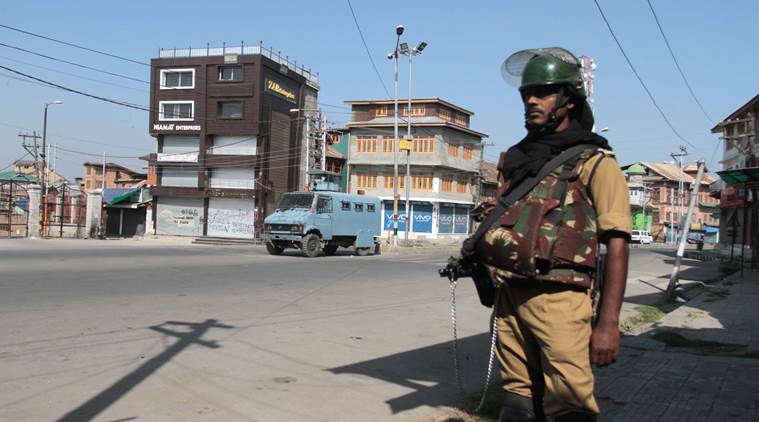View From The Neighbourhood
A weekly look at the public conversations shaping ideas beyond borders — in the Subcontinent.
Published: October 1, 2018 1:14:34 am

Dawn editorial refers to a piece that separatist leader Yasin Malik penned in Dawn where the latter refers to the governor as a “colonial sheriff” and “the fact that the BJP is trying to change Kashmir’s demography, as well as mulling a communal division of the region”. (Express Photo by Shuaib Masoodi)
Kashmir simmering
The September 29 editorial in Dawn ‘Kashmir violence’, is a scathing attack on the Indian government. “On Thursday”, it claims, “at least six people were killed in the region, while yesterday a strike was observed to protest the killings. Most of those killed in the recent spate of violence were Kashmiris targeted by Indian security forces.” Dawn goes on to blame the “heavy-handedness” of Indian security forces as well as recent political developments like the coalition government in the state falling and being “ replaced with governor rule — direct rule from New Delhi — in June while the BJP-led central government plans to hold local polls next month”. “However,” claims the editorial, “Delhi’s heavy-handed tactics are not going down well with the Kashmiri people.”
The editorial then refers to a piece that separatist leader Yasin Malik penned in Dawn where the latter refers to the governor as a “colonial sheriff” and “the fact that the BJP is trying to change Kashmir’s demography, as well as mulling a communal division of the region”. It concludes somewhat ominously: “It is also true that many parties in the occupied region, including Delhi’s loyalists, oppose local elections in the current repressive atmosphere. Unfortunately, few within the Indian establishment are willing to listen to sane voices and would rather smother Kashmiri voices.”
Political optics
It is understandable, even predictable, that the rhetoric of nationalism that India’s domestic politics has been witness to is being observed, and commented upon, in the neighbourhood as well. Senior journalist, Syed Badrul Ahsan, in an article in the Dhaka Tribune on September 26 remarks that “The quality of political discourse has been in steep decline of late in India”. After recalling instances of such decline, Ahsan focuses on “BJP President Amit Shah’s recent reflections on Bangladeshi immigrants”.
“His tone was one of fury, an attitude which Indian politicians usually reserve for Pakistanis, writes Ahsan, and argues that “describing Bangladeshis as having entered India in an unauthorised manner and insulting them as termites hits a new low even for the BJP”. Ahsan recalls that such imagery was used in Rwanda to make genocide possible. He concludes that “For Bangladesh, the truth today centres around factors which call for vigorous diplomacy. The BJP government in Assam has already muddied the waters.. with the ill-advised NRC.”
Munir Akram, former Pakistan ambassador to the UN, on the other hand, has written a somewhat ranting article against the BJP in Dawn on September 30. The provocation seems to be External Affairs Minister Sushma Swaraj’s attack on Pakistan on the floor of the UN general assembly. First, Akram claims that “Since assuming office, the BJP-RSS combine, not unlike the Nazis, has been on a systematic programme of coercion, intimidation and propaganda to impose racist (Hindu) supremacy in India.”
To justify his claim, Akram selectively quotes activists like Arundhati Roy, before making a sharp turn to warning the Indian Army against any further “surgical strikes”. He counsels that Pakistan “should stop asking for a dialogue with India” and “secure support for Pakistan’s positions from China and as many other countries as possible”. The polemic ends with some rather extreme advice to the Pakistan military: “Pakistan’s armed forces should enhance their readiness to deter and repel a possible Indian incursion across the LoC or the international border. It should be made clear to the US and others that any Indian military adventurism will lead to Pakistani retaliation.”
Oli’s ego
On the face of it, argues journalist Rupak D Sharma in his September 26 article in The Himalayan Times, Nepal Prime Minister KP Oli was the right man for his job after years of political instability in Nepal: “Oli started his job in mid-February on a high note, showing signs of making a complete departure from traditional governance practices marred by patronage and partisanship. The first few persons that he roped in his Cabinet drew accolades, as they were ‘clean figures’.”
But as the “momentum began to fizzle out”, in large part due to the PM’s focus on big-ticket infrastructure projects with India and China rather than issues like potholes, power and crime, that affect people, disaffection grew among the common people. “Instead of acknowledging the government’s shortcomings”, the article argues, “the PM sniped back stating his government had inherited bad roads and infrastructure from the previous government)”. And, “Over the months, the PM has started seeing every spontaneous outpouring of public anger as a conspiracy hatched by his opponent.” This hurdle, where people are seen as the opponents, does not bode well for Nepal’s politics, argues Sharma.
Curated by Aakash Joshi






































No hay comentarios:
Publicar un comentario